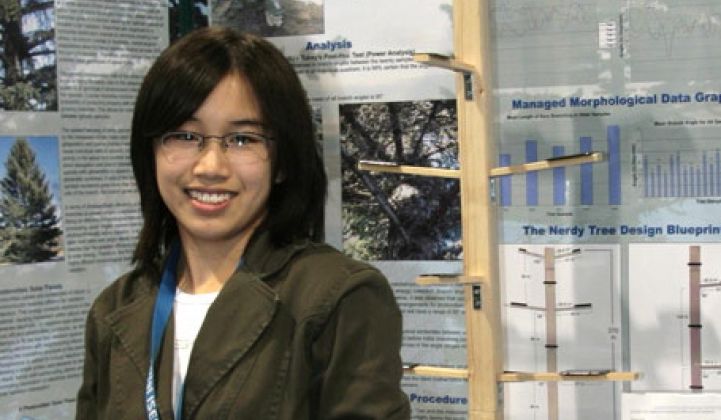Eden Full is the 19 year-old Canadian founder of the nerdicallly named Roseicollis Technologies, a very early-stage solar tracker idea that was granted $100,000 by PayPal co-founder and early Facebook investor Peter Thiel.
As you might have heard, Thiel has begun a "20 Under 20” grant program for young entrepreneurs through his Thiel Fellowship program.
Eden Full is a mechanical engineering undergrad at Princeton University with a product idea for cutting solar tracker manufacturing costs by 75 percent. As part of the fellowship, she’s preparing to take a brief hiatus from Princeton to move to the San Francisco Bay Area for two years. Some have described the program as essentially paying students to drop out of college, although dropping out is optional.
Amongst the 24 Thiel Fellowship winners is another solar tracking idea -- although that one is for 2-axis systems.
Full's tracking system is accurate to within 5 degrees, according to the inventor. It's based on passive bimetallic strips that, Full claims, can equal the accuracy in motor-driven systems. The system is applicable to single-axis trackers for flat-panel solar modules, as opposed to the dual-axis, extreme-accuracy required by high concentration PV systems (HCPV). Full came up the idea before she began her time at Princeton and she's filed provisional patents for the invention. Much of the IP is in the calibration of the bimetallic systems rather than the metals themselves, which can be made of steel and aluminum.
Full is suggesting that her trackers will be less expensive than the costs of trackers such as the T0 and T20 from SunPower, which add $0.35 and $0.50 per watt, respectively, according to knowledgeable industry insiders.
Trackers can provide a boost of up to 30 percent in energy harvest rates for flat panel solar. Solaria, a startup based in Fremont, builds a low-concentration flat-panel solar module specifically designed for single-axis tracking.
It's still very early days for this startup and the market entry point and business plan are still being settled. For now, it's a matter of refining the prototype and looking for the cost and performance benefits to be gained from this technology. Full already deployed a prototype in Kenya last summer with a research grant from Princeton.
Solar panel tracker company RayTracker was recently sold to First Solar. The CEO of that firm revealed that after receiving $3.5 million in venture funding from Idealab, Quercus Trust, and Phoenix Fire, the investors received a multiple of 12.8 or a sale price of $44.8 million.



